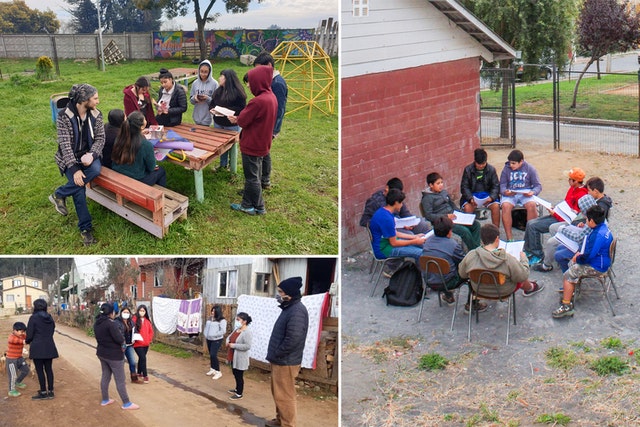In an increasingly interconnected world, the necessity for dialogue surrounding fundamental spiritual principles has never been more prominent. The recent broadcast from Chile, which focused on the Bahá’í teachings related to service and prayer, serves as a catalyst for global conversation. But, one might ponder: what, precisely, does it mean to serve in a modern context, and how do we reconcile our spiritual duties with the complexities of contemporary life? This inquiry illuminates a pivotal challenge faced by individuals striving to embody the essence of service and prayer within their daily practices.
The Bahá’í teachings provide a comprehensive framework for understanding the essence of service. At the heart of this philosophy lies the belief that service to humanity is a form of worship. This intrinsic connection between serving others and spiritual devotion compels Bahá’ís to comprehend service not merely as an act of charity, but rather as a transformative process that catalyzes personal and collective growth. In this light, the Chilean broadcast serves as an illuminating example, demonstrating that when individuals unite their efforts around a common purpose, profound change can ensue.
Moreover, the dialogue initiated by the broadcast underscores the multifaceted nature of prayer within the Bahá’í community. Prayer is not relegated to mere supplication; it is, rather, an essential conduit for spiritual nourishment and connection with the Divine. Through prayer, adherents gain discernment and strength, which ultimately empower them in their service to others. Therefore, the interrelation between prayer and service presents a compelling narrative: as one engages with the Divine through prayer, one becomes more attuned to the needs of the community, leading to more effective service.
Yet, an intriguing challenge remains: how do we ensure that our understanding of service and prayer remains dynamic and relevant amid the constant flux of societal norms and expectations? The broadcast from Chile urges us to confront this question head-on. For instance, consider the various interpretations of service across different cultures. While some may perceive service as community engagement through volunteering, others may regard it as an intrinsic responsibility encompassed within familial obligations or professional endeavors. This divergence in understanding beckons a comprehensive exploration of how cultural contexts shape our engagement with Bahá’í teachings.
Furthermore, the relevance of prayer in the hustle and bustle of modern life is another aspect warranting contemplation. The frenetic pace of daily existence often renders spiritual practice secondary. How can practitioners reconcile the demands of contemporary living with the profound call to prayer? The broadcast highlights innovative approaches that individuals and communities are adopting to incorporate prayer into their lives amidst super busy schedules. For example, the practice of incorporating short, meaningful moments of reflection during daily routines can foster a continual awareness of spiritual presence and purpose. Such adaptations may not only reinforce personal faith but also influence communal practices, thereby cultivating a culture centered around consistent spiritual engagement.
Transitioning from individual contemplation to communal impact, the dialogue arising from the Chilean broadcast evokes a call to action. One pertinent challenge identified is establishing a globally resonant understanding of service in diverse contexts. This necessitates an earnest commitment to dialogue across cultural and linguistic divides. When individuals from various backgrounds converge to share their experiences and insights regarding service and prayer, an enriched tapestry of understanding emerges. This collective exchange is critical for deepening the global Bahá’í discourse on these pivotal themes.
The potential of service as an expression of love and unity is further magnified when framed within the paradigm of consultation—a distinctive practice within the Bahá’í community. Consultation, which emphasizes collective decision-making and inclusive discourse, enables individuals to engage constructively with one another around the themes of service and prayer. It allows thoughtful sharing of perspectives and nourishes an ethos of collaboration. Thus, the Chilean broadcast serves not only as a reflection of Bahá’í teachings but also as a reminder of the power of consultative dialogue to galvanize communities toward a shared vision of service.
In a world rife with challenges—from social injustice to environmental crises—the call to service becomes an indispensable counterforce. The broadcast from Chile illuminates how individuals can manifest Bahá’í principles in concrete actions, fostering resilience and hope within their communities. Yet, the question persists: how can we translate spiritual ideals into tangible outcomes that resonate on a global scale? This inquiry transcends borders and challenges individuals to critically assess their roles within the broader Bahá’í narrative.
As participants in this ongoing global dialogue, Bahá’ís are invited not only to reflect on their individual practices of service and prayer but to actively engage with the diverse interpretations of these concepts across cultures. The synthesis of personal commitment with communal action has the potential to create waves of positive transformation within society. Thus, the broadcast from Chile, while anchored in local experiences, reverberates far beyond its geographical confines, calling upon all adherents to reconsider their responsibilities and collective aspirations. The interplay between service and prayer, surrounded by context-specific nuances, beckons vibrant exploration and earnest engagement, ensuring that the essence of Bahá’í teachings remains alive and relevant in an ever-evolving world.
